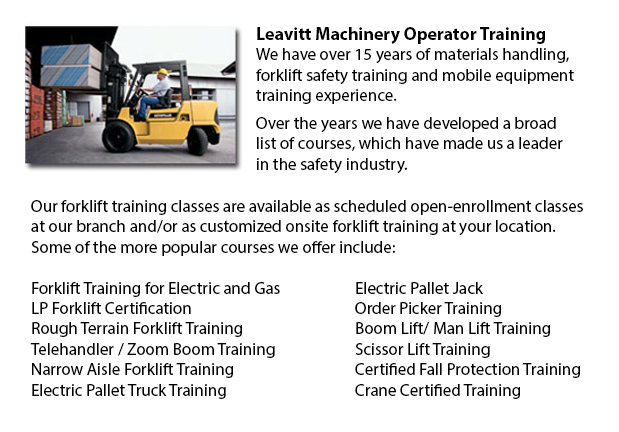
Forklift Certification Schools Vernon - Forklift Certification is mandatory in North America. Thus, forklift training programs are necessary both for companies and for people searching for work in industries as operators of forklifts. Forklift training focuses on safety and health issues involved in forklift operation. Safety concerns affect both the forklift driver and personnel and other individuals who are in the vicinity of the forklift. Companies might be subject to penalties if they are caught with un-certified operators during a check up. There are various convincing reasons why businesses have to comply with forklift standards.
Before the worker or trainee is certified to operate a forklift, the majority of state, provincial and federal regulations will require the worker undergo an evaluation of the skills needed for forklift safety. There are numerous forklift certification schools providing courses for employees and there are also schools which offer online forklift training. Nevertheless, employers have to be aware that forklift certification training is not "just a test". Proper forklift training should include several fields of study, like for example theory and hands-on practice. Rules do not need employers to have an outside organization to certify forklift operators.
The suggested program for a quality forklift certification service includes both an onsite component and classroom training. Classroom training usually features informative sessions with power point presentations, videos, discussions and models. Students typically are needed to write a test to check for comprehension of subject matter. Certificates of completion are given upon successfully finishing the class.
An evaluation of the student's use of the equipment comprises pre-operational equipment inspections, knowledge of job site hazards, a pass/fail operational test and operational instruction.
Training typically comprises the following subject areas: Controls & Instrumentations; Understanding regulations and legislations; maneuvering and Steering; Engine maintenance and Operation; Visibility, Fork & Attachment Restrictions; Rated Capacities, Stability, Inspection & Maintenance; Load Control; Refueling; Pedestrians, and Hazardous Places & Rough Terrain Operation. What's more, there are training courses offered for employees who are transitioning to new job positions.
-
Heavy Equipment Training Vernon
Heavy Equipment Training Vernon - The two most common kinds of heavy equipment training are categorized into the categories of equipment; equipment which is fashioned with tracks and those with rubber tires. The tracked vehicle are heavy duty machine... More -
Aerial Lift, Boom Lift, Man Lift, Scissor Lift Training in Vernon
Lift tables or scissor platform lifts could lift up both people and materials vertically. They are most often utilized in industrial, construction and commercial environments. Usually, the use of a scissor lift is to lift and lower materials from one... More -
Crane Operator Classes Vernon
Crane Operator Classes Vernon - Crane operator training is for operators and supervisors of overhead lifting equipment. The course is suitable for both current and new operators. Course content addresses relevant provincial, state and federal safety... More -
Zoom Boom Training Vernon
Zoom Boom Training Vernon - Zoom Boom Training focuses on correctly training potential operators on variable reach forklifts. The training objectives consist of gaining the knowledge of the machine's physics and to be able to define the tasks of the... More -
Skid Steer Ticket Vernon
Skid Steer Ticket Vernon - The lift arms on the skid-steer loader are situated alongside the driver together with pivots at the back of the driver's shoulders. These features makes the skid-steer loader different than the traditional front loader. Be... More -
Manlift Ticket Vernon
Manlift Ticket Vernon - The Elevated Platforms and Manlifts Certification course helps to provide the needed training on the safe operating procedures, work practice, rules and regulations regarding the daily activities for the operators of this mach... More -
Scissor Lift Ticket Vernon
Scissor Lift Ticket Vernon - The scissor forklift has been a great advantage to many businesses in view of the fact that the effort and manpower to run one of these machines is very minimum. Furthermore, numerous workplace injuries have been prevente... More -
Aerial Lift Safety Training Vernon
Aerial Lift Safety Training Vernon - There are roughly 26 to 30 construction fatalities in North America due to the utilization of aerial lifts. Nearly all of the individuals killed are craftsmen like for example painters, electrical workers, laborer... More

Forklift Training Vernon
TOLL FREE: 1-888-254-6157
Vernon, British Columbia
forklifttrainingvernon.com
Email Us
About Us


